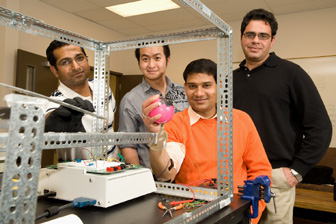Idaho State University receives additional $1.4 million from DOD to work on phase II of developing ‘intelligent’ prosthetic hand
June 3, 2010
A multi-disciplinary group of Idaho State University researchers has received an additional $1.4 million from the U.S. Department of Defense to develop a new type of prosthetic hand under Phase II of the project.
"The prosthetic hand we are building is very different from other artificial hands that are out there," said Subbaram Naidu, ISU professor and associate dean of the College of Engineering, and the grant's principal investigator. "Our artificial hand will not be preprogrammed. Instead, our hand will allow users to control in real time a much broader range of motions."
 This eclectic group of ISU researchers includes five faculty from the College of Engineering: Professor Subbaram Naidu, electrical engineering and associate dean of the College of Engineering; Professor Marco Schoen and Assistant Professor Alba Perez, mechanical Engineering; Associate Professor Steve Chiu, computer science; and Professor Solomon Leung, civil and environmental engineering. They are in collaboration with Professor Alex Urfer and Associate Professor Jim Creelman, from the Department of Physical and Occupational Therapy in the Kasiska College of Health Professions, and Professor James Lai from the College of Pharmacy.
This eclectic group of ISU researchers includes five faculty from the College of Engineering: Professor Subbaram Naidu, electrical engineering and associate dean of the College of Engineering; Professor Marco Schoen and Assistant Professor Alba Perez, mechanical Engineering; Associate Professor Steve Chiu, computer science; and Professor Solomon Leung, civil and environmental engineering. They are in collaboration with Professor Alex Urfer and Associate Professor Jim Creelman, from the Department of Physical and Occupational Therapy in the Kasiska College of Health Professions, and Professor James Lai from the College of Pharmacy.
The group has completed Phase I of their research during the last two years and is moving on to Phase II of the collaborative project to develop a "smart" prosthetic hand. Total funding on this multi-phase grant now more than $2.2 million.
The hand uses nerve signals measured at the surface of the skin to fully simulate natural grasping, lifting and twisting motions. In brief, ISU researchers will use skin sensors for measuring electromyographic (EMG) signals, recording the electrical activity in skeletal muscle. The researchers will then try to identify and classify which EMG signals correspond to intended hand motions. Next, they will try to develop an embedded "intelligent" control for prosthetics using a variety of sophisticated control techniques. After developing a robotic hand, the group will test its sensing and transmission systems.
The researchers will also test the biocompatibility of the hand and bio-signaling. Current prosthetics are made of materials that can cause inflammatory reactions to the limb where they are attached. ISU researchers are exploring how to create artificial hands and implants that can be made of materials that will cause fewer inflammatory reactions.
The new Phase II grant is a boon for ISU graduate students, providing funding to employ eight doctoral students, plus several master's students in various disciplines.
On the engineering side of the project, much of research work is done at the ISU Measurement and Control Engineering Research Center (MCERC) in the ISU Engineering Research Complex located at 1040 South Second Avenue in Pocatello. Most of the biomedical research is being done in the ISU College of Pharmacy research laboratories.
This study is an effort to rehabilitate military personnel. However, the proposed work can also be used for people in civilian life who have lost their limbs due to accidents or birth defects.
"This is a worthwhile project not only because of the benefits it can potentially provide the military, but can affect the civilian population as well," said Dr. Schoen. "We want to make the hand as affordable as possible."
###
About Idaho State University
Idaho State University, a Carnegie-classified doctoral research institution founded in 1901, educates approximately 15,000 students per year in more than 280 programs. It is Idaho’s lead institution in health professions and medical education. Its seven colleges engage in a broad range of innovative research, teaching, and learning in the natural and physical sciences, humanities, performing and visual arts, education, engineering, business, pharmacy, and technology. Visit ISU today at www.isu.edu.
Categories:
